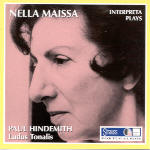Born in Turin in 1914, pianist Nella Maissa settled in Portugal in 1939. She devoted much of her career to championing both new music and lesser-known older repertoire by Portuguese composers, like Bomtempo. Among Maissa’s Portuguese premieres were the third piano concertos of Prokofiev and Bartok and Hindemith’s 1942 piano cycle Ludus Tonalis. She recorded Ludus Tonalis for radio broadcast in 1958, and that transmission is preserved here. Those who consider (not without justification) the work to represent Hindemith’s dryer, more doctrinaire side may well change their minds after hearing Maissa. What a fabulous pianist she is! The fugues are delineated with intimate drama, intelligently scaled dynamics, and mesmerizing, dry-point articulation that recalls Glenn Gould’s contrapuntal keyboard mastery. And Maissa always unearths the music’s underlying wit, as revealed in her skittish, light-fingered virtuosity in the Ninth Interludium, or in the playfulness she brings to the usually banged out March (Interludium 13). The Valse (Interludium 23) nonchalantly trickles off the pianist’s fingers–and leaves you bewitched. And I don’t think I’ve heard the arpeggio sequences in the Praeludium and Postludium (the latter is the Praeludium played backwards) so ravishingly shaded.
Each movement is announced (in Portuguese) before it is played. Some listeners may find this distracting, but it actually helps you focus your attention more sharply and individually on each piece. The sound is acceptable considering its provenance, although I suspect the studio piano was less than a regulation concert grand. But that doesn’t matter. Nella Maissa invests this music with meaning and profound musicality, and I heartily recommend that you hear her.
































